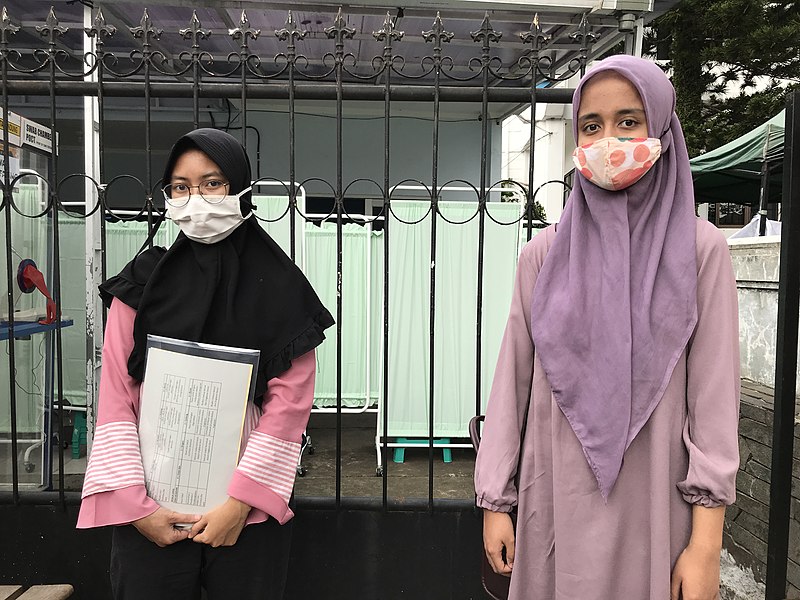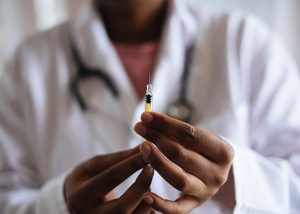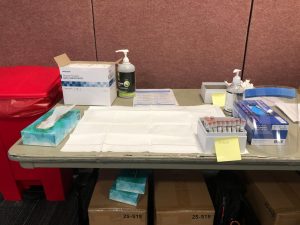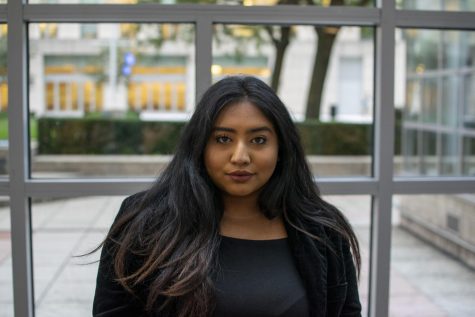Vaccine Vulnerabilities
Hesitancy among public throws Immunization efforts into uncertainty
RIO TUASIKAL VIA WIKIMEDIA COMMONS
Volunteers participating in a COVID-19 vaccine trial in Indonesia in August 2020. As of Nov. 24, there were five potential vaccines that have made it to Phase 3 clinical trials.
December 2, 2020
As COVID-19 cases continue to climb across the country, the development of a cure has become even more crucial. According to the World Health Organization, as of Nov. 30, there have been over 13 million cases and over 263,000 deaths in the United States since Jan. 3. In November alone, there were over 4 million new cases nationally.
According to a New York Times database, since the COVID-19 outbreak in New York, the Fordham community has had 112 cases. Additionally, the database recorded that COVID-19 cases at Fordham were escalating once again.
Building Herd Immunity
To most effectively combat the pandemic, it is important to achieve herd immunity. This type of resistance to the virus occurs when there are enough people within a given population that have preexisting immunity as a result of infection or vaccination. Because an entire community is protected from the virus, herd immunity slows down the spread of the virus because it decreases the rate of contraction.
“I am optimistic about their efficacy and think Fordham should be promoting all of the science that comes out regarding these vaccines as new information is released.” Maria Nettgen, FCLC ’22
Mayo Clinic reported that more contagious viruses will necessitate a larger proportion of the population to be immune to it to minimize its spread. Herd immunity also protects those who are not able to receive vaccines due to compromised immune systems because there are significantly fewer people who can spread the virus to them.
According to the Centers for Disease Control and Prevention (CDC), what percentage of the population needs to get vaccinated to develop national herd immunity to the coronavirus is still unknown. Also, revaccination may be necessary to maintain this communal immunity.
The CDC reported that as of Nov. 24, there have been five coronavirus vaccines that made it to Phase 3 clinical trials. Only one of these vaccines needs one shot to be effective; the rest of the vaccines require a person to be inoculated twice.
Growing Concerns Over Vaccine Hesitancy
Although it is likely that a vaccine would most significantly reduce the effects of the pandemic, there is growing public distrust that is discouraging people from potentially receiving the injection. There is a minority of the population who is skeptical about the vaccine and believe it would harm rather than help their health. Mayo Clinic reported that religious objections would be another factor that may increase opposition to the vaccine and in turn inhibit herd immunity.
As of Nov. 1, Gallup polling suggests that only 58% of Americans would get the vaccine, while over 40% were unwilling. Among 18- to 44-year-olds, the biggest concern contributing to vaccine hesitancy was a “rushed timeline” to produce it. Overall, the willingness to get the vaccine has dropped since the beginning of the year. The Siena College Research Institute’s latest poll suggests 24% of New Yorkers will not take a vaccine for the coronavirus when it becomes available.
Moreover, Black and Indigenous Americans share a common concern regarding a coronavirus vaccine due to historical abuse and exploitation of these groups by the scientific community. A Pew Research Center survey found that nearly 66% of white Americans shared the belief that the benefits of experimental trials of the vaccine would outweigh the risks, while 60% of Black Americans believed that the risks would outweigh the benefits.
“I believe that Fordham should do everything they can to instill faith in these vaccines in our community and I hope to see more discussion about the trials and the vaccines in my science related classes this year.” Hope VanDerwater, FCLC ’21
Throughout the country, Black and Latinx Americans have been disproportionately affected by the virus. Nevertheless, recent data suggests that they are also being underrepresented in the efficacy trials as a result of both limited cooperation and under-recruitment by testing officials. To create a vaccine that is effective for all Americans, infectious disease expert Dr. Anthony Fauci believes there needs to be increased inclusion of minority groups during these clinical trials. Regaining the trust of these groups is vital for representative data and herd immunity.
The CDC reported that the Advisory Committee on Immunization Practices (ACIP) outlined four ethical principles for vaccine distribution if supply is limited. Two of them include mitigating health inequities and promoting justice. The ACIP aims to minimize health disparities that have caused certain groups to bear the brunt of the pandemic by eliminating systemic barriers to vaccination. To achieve this, it is essential for public health and scientific communities to mend the mistrust among these groups
University Plans Regarding Potential Vaccine
Higher education institutions will soon have to decide how to deal with this distrust among students and faculty members. Hope VanDerwater, Fordham College at Lincoln Center (FCLC) ’21, emphasized the importance of Fordham addressing the growing apprehension regarding these vaccines and safety. She said, “I believe that Fordham should do everything they can to instill faith in these vaccines in our community and I hope to see more discussion about the trials and the vaccines in my science related classes this year.”
Many students are optimistic about this vaccine as well. Maria Nettgen, FCLC ’22, expressed her confidence in the Phase 3 trials of the vaccines. She echoed, “I am optimistic about their efficacy and think Fordham should be promoting all of the science that comes out regarding these vaccines as new information is released.”
Fordham already requires two measles, two mumps and one rubella vaccine upon matriculation. If a vaccine is approved by the Food and Drug Administration, states and colleges may be able to mandate that all students receive it to gain entry on campus.
“Once a vaccine or vaccines are approved by the Federal Food and Drug Administration and available, proof of vaccination will be mandatory for all faculty, students, and staff who will be on campus.” Bob Howe, assistant vice president for communications
On Nov. 7, the New York State Bar Association (NYSBA) approved a resolution urging the state to make the upcoming COVID-19 vaccination mandatory. The NYSBA recommended that this should occur if the amount of initial voluntary vaccinations is not enough to help the population build mass immunity to the virus so long as there is consensus among the scientific community regarding its safety and efficacy. Additionally, they proposed that this vaccine should be compulsory regardless of “religious, philosophical or personal” objections.
“Once a vaccine or vaccines are approved by the Federal Food and Drug Administration and available, proof of vaccination will be mandatory for all faculty, students, and staff who will be on campus,” Bob Howe, assistant vice president for communications, said. “The only exceptions will be for those people who have documented medical reasons for not being vaccinated.”
Across the Fordham community, some students support a compulsory coronavirus vaccine. VanDerwater said, “I do think that once there are enough vaccines, Fordham should require students to get vaccinated to return to campus, although I believe they can only do so if they provide vaccinations on campus, as they are currently doing with the required COVID tests.”
When asked if there were plans to distribute the vaccine on campus Howe said, “It’s too soon to say yet. We have no idea how quickly the vaccine will be widely available.”
The CDC stated that if supply is limited when the vaccine comes out, the ACIP will first consider healthcare personnel, essential workers, the elderly and those who have underlying medical conditions to receive it.
As the need for a vaccine increases, public health experts, scientists and government officials must find ways to build trust with the public whom they serve. Without public compliance, even the most efficacious vaccine will not be enough to curb the coronavirus crisis in the near future.














